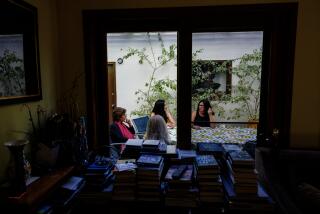Forum Debates Assisted Conception Issue
- Share via
At first, when she couldn’t get pregnant, Candace Cain was in denial. Then she struggled with whether she was simply fated to never have children.
“I wondered: Is this God’s decision?” said Cain, 39. “I decided it couldn’t be.”
Cain, of Foothill Ranch, was among 70 people attending a Whittier Law School forum Friday on the legal, medical and ethical conundrums of so-called “assisted reproductive technologies.” Experts from a range of disciplines gathered to discuss an issue that has spawned not only a wide debate, but a new legal specialty.
Orange County has in many ways served as a flash point for the debate, prompting Whittier students and faculty to choose the topic as the centerpiece for their annual health law forum, said professor Judith Daar, a leading legal thinker on the issue and faculty advisor to the student organizers.
“It just seemed right . . . to focus on what has been the center of the bioethics community down here,” Daar said.
In 1990, Mark and Crispina Calvert, a Tustin couple, paid a woman $10,000 to bear a child for them. The case rose to national prominence when the surrogate mother, Anna Johnson, decided she wanted to keep the child. The Supreme Court eventually ruled in favor of the Calverts in 1993.
In 1995 three doctors from a UC Irvine fertility clinic were charged with a number of improprieties, including transferring eggs or embryos to scores of patients without the permission of the women involved.
Doctors and scientists have made dramatic advances in recent years in their ability to help couples have children, speakers said.
The forum began with several of the speakers recalling where they were more than two decades ago when Louise Brown, the first test-tube baby, was born. Brown’s 21st birthday in July will mark a coming of age not only for her but also the field of reproductive technology that produced her, said Dr. Bill Yee, a UC Irvine professor.
Today, the field is a $2-billion-a-year industry and continues to grow exponentially, serving an estimated one of six American couples who are infertile.
Yet with the dramatic medical advances have come difficult ethical and legal questions, the experts said. What is medically possible is not always morally correct, the participants agreed. The difficulty is in determining precisely where the lines should be drawn.
Among the questions raised Friday:
* At what point, or after how many failed in vitro attempts, should a doctor tell a couple to desist and perhaps consider adoption?
* Could doctors who accidentally or intentionally dispose of frozen embryos be charged with homicide?
* Should parents be allowed to choose from a veritable menu of sperm and egg donors to produce the perfect child?
* Should so much money be poured into reproductive technologies when countless children are born in poverty, without parents or proper medical treatment?
But a contingent of attendees were women like Cain who have struggled through years of futile fertility treatment. They gave the event an emotional tenor, reminding participants that thousands of couples across the country are painfully living out the issues being casually discussed in the academic forum.
“It’s been horrendous,” said Cain, referring to her fruitless six-year quest for a child.
In two weeks, Cain will undergo her first in vitro fertilization attempt, to the tune of $14,000. She has tried everything from artificial insemination to herbal Chinese medicine, to no avail.
Similarly, Vanessa Poster, 35, has endured four years of fertility treatment, including a recent failed in vitro attempt. She drove from her home in Redondo Beach to attend.
“It’s our reproductive right,” said Poster, her voice quavering in anger, at one point during a panel discussion on ethics.
Said Poster: “Going through this is one of the most horrible things in my life . . . People who don’t go through it really have no idea.”






